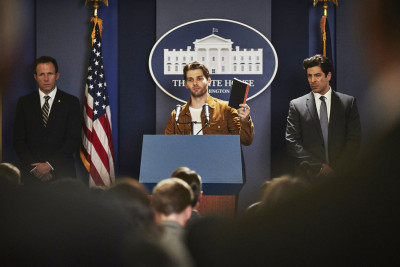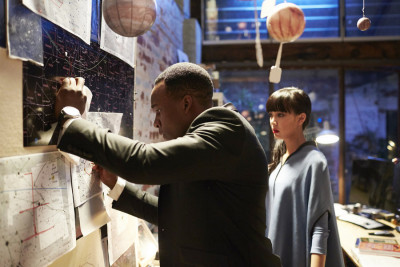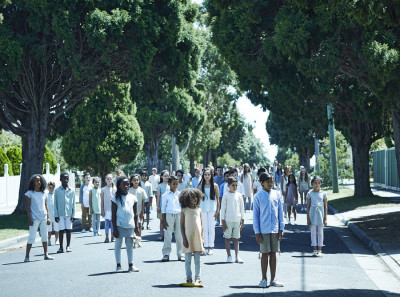
CHILDHOOD’S END — “The Overlords” Episode 101 — Pictured: Mike Vogel as Ricky Stormgren — (Photo by: Ben King/Syfy)
While watching Childhood’s End (Syfy, Mon-Wed, 8/7C), I was reminded yet again of Arthur C. Clarke’s famous maxim that any sufficiently advanced technology would be indistinguishable from magic.
When mysterious aliens arrive, they shut down power and communications (gently lowering aircraft to the ground so as not to harm anyone) long enough to deliver a simple message: we’re here to help you overcome war, famine, crime and pestilence. Each person receives this message from a simulacrum of the deceased person who means the most to them.
The alien who delivers the message is called Karellen (Charles Dance, Game of Thrones), but he does not give humanity a name for his species/race, so a doubting media mogul labels the aliens The Overlords.
Karellen chooses Ricky Stormgren (Mike Vogel, Under the Dome) to be his voice on Earth – creating for him a familiar environment whenever he visits the alien ship: the bridal suite at the Four Seasons hotel. This setting comes from Ricky’s mind and it will play a significant role throughout because of its meaning for Ricky.

CHILDHOOD’S END — “The Deceivers” Episode 102 — Pictured: Osy Ikhile as Milo Rodricks — (Photo by: Narelle Portanier/Syfy)
The doubting Thomas mogul, Hugo Wainwright Jr. (Colm Meaney, Hell on Wheels), forms the Freedom League to prepare for – and fight if – the aliens have sinister motives (which he’s pretty sure they have). His increasing paranoia is not helped by their not revealing what they look like.
The other major players are a California couple – Jake (Ashley Zuckerman, Manhattan) and Amy (Hayley Magnus) Gregson and their son Tommy; a boy named Milo Rodricks (Osy Ikhile, Misfits), who wants to learn everything about the Overlords and grows up to be an astrophysicist; Peretta Jones (Yael Stone, Orange is the New Black), a Christian who begins to question her faith as the aliens make Earth a virtual heaven; Rachel Osaka (Charlotte Nidao, Please Like Me), a Japanese zoologist who works with Milo; Ellie Ryberg (Daisy Betts, The Last Resort), Ricky’s fiancée; Dr. Rupert Boyce (Julian McMahon, RED), a scientist dedicated to man’s understanding of the universe, and Annabel (Georgina Haig, Fringe, Once Upon a Time), Ricky’s deceased wife.
Childhood’s End was the novel that inspired Stanley Kubrick’s 2001: A Space Odyssey – and there are moments (especially in the third episode) that will remind of that film. The novel was an exploration of one way that humanity could evolve, while also exploring themes of family, ethics and morality – and playing on how the arrival of an extraterrestrial lifeform that could rid our planet of all our flaws (save only mortality) might affect belief systems built around a god or gods.

CHILDHOOD’S END — “The Children” Episode 103 — Pictured: The Children — (Photo by: Ben King/Syfy)
The miniseries does all these things with a closing scene in the premiere providing – in a few brief moments – a scene that brings them all into focus.
Childhood’s End’s relationships feel right because the casting is superb; the unearthly triangle between Ricky, Ellie and the avatar of Annabel is one of the most poignant on television, for example.
Matthew Graham (Life on Mars, Doctor Who) does a tidy job of bringing Clarke’s classic novel into the present – making some alterations that make sense without sacrificing the novel’s thoughtfulness and rigorous plot structure. Childhood’s End was directed by Nick Hurran (Sherlock, Doctor Who) and presents the tale in a measured manner – balancing emotional beats with exposition and action in a delicate balancing act that only occasionally feels too slow and unwieldy, but allows the viewer to understand everything that’s going on.
Though it feels a bit heavy on the portentousness, Childhood’s End is thought provoking fun – even if it doesn’t quite reach the epic feel its creators were shooting for.
The childhood of the title is humanity’s and the miniseries is about that moment when a child must leave home and their parents must let them leave. Childhood’s End plays that moment for both its joy and its pain.
Final Grade: B